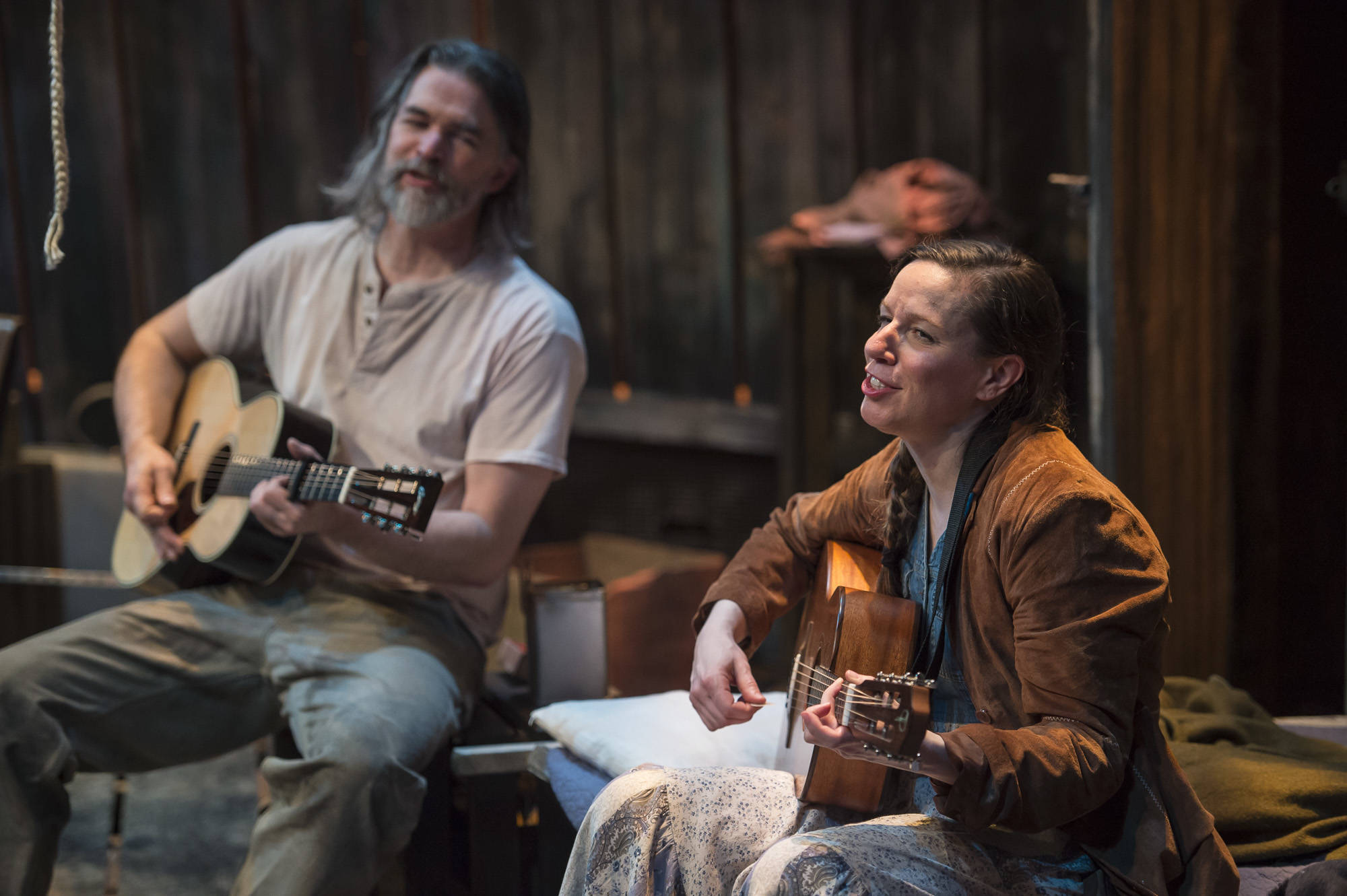If given one word to describe Perseverance Theatre’s final production of the 2017-2018 subscription season, “The Arsonists” by Jacqueline Goldfinger, it would be this: “haunting.”
Every aspect of this National New Play Network rolling world-premiere is strange and beautiful, from the darkly lyrical script, to the melancholic elegance of the acting, directing, stage set, sound design and even the old-time Appalachian folk music, performed onstage by the actors themselves.
For 70 spellbinding minutes — one act, no intermission — Perseverance presents a Southern Gothic myth inspired by the ancient Greek tragedy of “Electra.” Set in the deep, dark recesses of the Northern Florida swamp, “The Arsonists” tells the story of a small-time father-daughter arsonist team dealing with the aftermath of a job gone horribly wrong. After playing with fire his entire life, the father, a character simply called “H,” finally gets burned… to death. But H’s soul is stuck in limbo, trapped inside the family’s clapboard cabin, where his adult daughter, a character simply called “M,” has buried him under the floorboards. “M” must choose between her own desire to keep her father “alive” as a ghost, or end his torment by helping him become “complete.”
[PHOTOS: See photos from the play here]
In this way, “The Arsonists” has deep roots in both classical mythology and the Southern Gothic literary tradition. Goldfinger simultaneously honors Sophocles, Euripides and Eugene O’Neill’s “Mourning Becomes Electra,” as well as more contemporary forms. The opening scene, in which a soot-covered woman drags a dead body in a burlap sack while shrieking blood-curdling obscenities — talk about an entrance! — would be equally at home in a Cormac McCarthy novel or a hardboiled HBO series. And I mean that as a serious compliment.
A sweet sadness pervades “The Arsonists,” pungent but pleasing, like the smell of gasoline fumes. Light on plot yet simultaneously epic in feel, Goldfinger’s script manages to be exquisitely written without many words. In fact, lengthy sections pass with no dialogue, as father and daughter set about the methodical task of weaving, measuring and cutting rope fuses before dipping them in accelerant and hanging them up to dry. All the while they sing, often in two-part harmony. The effect is downright hypnotic.
Of course, the strength of “The Arsonists” lies in the fullness of its production. The play unfolds on one set, courtesy of scenic designer Sara Ryung Clement, a faithful reproduction of a typical shotgun shack, except with a raked floor and slanting walls, as if to suggest a world gone off-kilter. Not to be outdone, lighting designer Lauren MacKenzie Miller and sound designer Lucy Peckham conspire to evoke smoke, fire, the wilds of Florida and the supernatural forces at work on the father’s ghost.
However, in a two-person play, success hinges on its actors. Under the taut direction of Art Rotch, who also serves as Perseverance Executive Artistic Director, Allison Holtkamp and Aaron Elmore shine as M and H, respectively.
You may recognize Holtkamp as a member of local stand-up comedy troupe “Club Baby Seal,” but here, her performance is anything but funny. Rather, she delivers a wonderfully nuanced portrayal of a daughter dealing with grief, loss and redemption, caught between the past and the future, in a limbo of her own making, her own eternal “present.”
For his part, Elmore has been a company member at Perseverance Theatre since 1991, as well as the co-founder and co-artistic director of Theatre in the Rough. Elmore is a gifted actor, and “The Arsonists” puts those gifts on full display. His H is all raw emotion mixed with fatherly wisdom, deep philosophy wrapped in a Southern drawl.
Most impressively, both Holtkamp and Elmore make music together — literally. As I said, “The Arsonists” interweaves old-time folk songs throughout the play. Not only do both actors sing (quite well), but they accompany themselves on guitar — while in character. Moreover, Holtkamp and Elmore — along with local musician Mike Maas — receive “music by” credits in the playbill, which means they helped arrange the songs, too. And if that’s not enough, I doubt either actor played much guitar, if any, prior to rehearsals. So, in addition to all the other work involved in putting on a show, Holtkamp and Ellmore learned an incredibly difficult and frustrating instrument (believe me, I know from experience). And they sounded good.
Now, that’s not to call “The Arsonists” a perfect play. As far as storyline goes, some theatregoers might want more. Certain questions also felt unanswered; specifically what “missing piece” will ultimately bring the father his “missing peace.” Personally, I found the “Electra” element a bit underdeveloped, considering the original story deals more with vengeance and matricide than the father-daughter relationship. And ultimately, one might wonder about Goldfinger’s blend itself: Greek mythology mixed with Southern Gothic mixed with Appalachian folk songs mixed with arson — why?
But at the end of the day, “The Arsonists” works. More than merely a “mood piece,” it explores the fine lines separating parent and child, life and death, earthliness and eternity, letting go and moving on, profanity and poetry, the grotesque and the sublime.
• Geoff Kirsch is a freelance writer living in Juneau.

